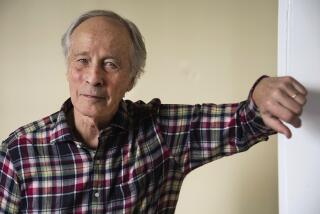The Forrest Gump of Presidents
- Share via
I teach English and writing at various colleges in New York City. Many of my students overcome serious hardships to attend. Some work full-time jobs or care for young children; others have parents who are absent or ill, drug-addicted or in prison. The vast majority of my students complete their work and graduate. Just about all of them make better grades than George W. Bush made at Yale, but I doubt that any of them will go on to be president. They don’t have the luck.
You don’t have to be an educator to be sickened by Bush’s irreverent remarks at the Yale University commencement last week. “President Bush has explained his uncomfortable relationship with his alma mater as a distaste for Ivy League elitism,” wrote one reader of the New York Times, “but what could be more elitist than bragging about how you napped through four years of college?” A writer to the Los Angeles Times, incensed at Bush’s flip tribute to the “ ‘C’ students,”--”You, too can be president of the United States”--observed, “I’m sure the Yalies who worked hard for their academic success were delighted to be reminded that Bush and Vice President Dick Cheney’s microscopic collective in no way prevented them from riding into the White House on the shoulders of others.”
Trying to be modest, Bush instead came off as smug and spoiled in his commencement address. With tuitions skyrocketing, contempt for one’s own college education is a luxury few can afford. When my students are dissatisfied with a grade, they beg, plead, complain and cajole. I don’t think many of them smirk, because they know that, for many of them, the difference between academic success and academic failure is not, as it was for our president, the difference between a JD and an MBA, but the difference between a white collar and a job at Burger King.
Bush could always afford to smirk in the face of his scholarly failings, because such a trifle as grades was never going to affect, much less determine, his future. His story was written by his name, his money, his family. He alluded to as much in his speech. Though his self-deprecating jokes about poor marks, snoozing in the library and booze-induced blackouts have gotten most of the press, perhaps even more troubling was his stated belief that “Life ....writes its own story. And along the way, we start to realize we are not the author.”
That’s a breathtaking statement for the president of the United States to make. So many of the essays I assign my freshmen deal with overcoming adversity, and encourage them to rise to life’s challenges and control their own destinies. “Circumstances don’t create character,” I tell my students, “they reveal character.” In her famous essay “On Self-Respect,” Joan Didion wrote that “the willingness to take responsibility for one’s own life ... is the source from which self-respect springs.” I think this message speaks to my students, but I’m not sure if Bush would appreciate it.
He has not been the author of his own life. Circumstances allowed him to “fail upward” and retain his unshakable optimism. Circumstances led him to Yale, to wealth, to the presidency. Bush is a good-natured man because good things happen to him; like Forrest Gump, he is pulled along by good fortune, rather than by convictions or determination.
Can you imagine an Al Gore or a Bill Clinton claiming that he is not the author of his life? Gore, like Bush, was a child of privilege, but he made a conscious decision not to rest upon or rely on that privilege; seeking to live up to his name, Gore has led a life of accomplishment because he elevated his self-expectations. Clinton grew up disadvantaged but managed to write his story with hard work and ambition, with his own choices, for good or ill. In light of the failed attempt to remove the former president from office, Didion called Clinton the luckiest man in America. She didn’t know that President Gump was on the way.
More to Read
Sign up for Essential California
The most important California stories and recommendations in your inbox every morning.
You may occasionally receive promotional content from the Los Angeles Times.













